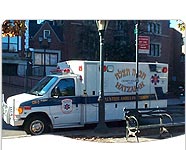 |
 
How to Be Repellent -- to Bugs
Want to avoid bug bites this year? Get them before they get you.
By Star Lawrence
Reviewed By Michael Smith, MD
WebMD Feature
You're lying in your tent and you hear that high-pitched drilling
noise, tiny at first, then louder, louder. Mosquitoes! Is there
anything more annoying? Well, how about ticks? Or those insane no-see-ums?
Sssh, don't tell, but bugs outnumber humans gazillions to one and
are only letting us live here.
In recent years, however, these aggravating little monsters have
become downright dangerous, spreading serious diseases in many parts
of the country. According to the CDC, more than 20,000 cases of
insect-related illnesses are confirmed each year.
West Nile virus has slowly been making its way across the country
since its arrival in the U.S. in 1999. Unfortunate campers and residents
in many parts of the Northeast trail IV poles as they undergo long-term
antibiotic treatment for tick-borne Lyme disease. Rocky Mountain
spotted fever, which also is tick-borne, has climbed down from the
Rockies.
It's war!
Keeping insects at bay is a battle fought on several fronts. First,
you can try to get them before they get you. This is the philosophy
behind community spraying efforts, which often end up bathing humans
in insecticide, killing beneficial insects, and leaving many fertile,
harmful insects left to fight again. At very least, though, you
could drain standing water in your yard so mosquitoes won't breed
in it.
People also apply insecticides to themselves or their clothing.
One such, permethrin, is sold in a number of products, including
Permanone (check labels). The CDC recommends applying this to clothing,
not skin.
Even the most popular "skin" insecticide, DEET -- used
as a repellent by one-third of the population in the United States
-- must be used with extreme caution. A study done at Duke University
and published in the November 2001 Journal of Experimental Neurology
showed that frequent and prolonged applications of DEET (in an average
human dose adjusted to rat size) caused neurons to die in regions
of rat brains that control muscle movement, learning, memory, and
concentration.
"The rats didn't look any different," says lead researcher
Mohamed Abou-Donia, PhD, professor of pharmacology and cancer biology
at Duke, "but when we challenged them with a task, they failed."
Abou-Donia became interested in this subject while studying veterans
who used DEET in concentrations of 70% and in concert with permethrin
(not recommended, by the way). "We think part of the problem
experienced by some vets may be due to DEET," says Abou-Donia,
referring to Gulf War veterans' illness.
If You Must Use DEET
In Canada, DEET concentrations cannot exceed 30%. Here, hundreds
of products, some containing 100% DEET, are on the shelves. Abou-Donia
and Ken Holscher, PhD, an associate professor of entomology at Iowa
State University, urge extreme caution in using DEET.
" Use products containing DEET in low concentrations only (30%
or less for adults, 10% or less for children)
" Never apply DEET products to infants under 2 years old
" Even for older children, be very careful and apply sparingly,
if at all. ("I shudder when I see people having their kid stand
there with his arms out while they spray and spray him," Holscher
says. "You don't want to breathe this stuff, either.")
" Apply it by hand, not spray. Put on your own hands, not the
child's, and wash afterward.
" Don't apply to eyes or lips
" Never apply to wounds
" Don't use DEET or even spray your yard if you are taking
medications. (There are few studies on interactions, Abou-Donia
says, and those interactions can be serious).
Safer Alternatives?
Another approach is to attract bugs to their death. This is the
idea behind zappers. "I tell people to put those in the neighbor's
yard," laughs Holscher. "After all, (zappers) attract
insects before supposedly killing them."
A fourth approach is to make yourself or your campsite or patio
so disgusting bugs will fly away on their own. After all, how is
a mosquito going to find juicy old you in this vast world without
a great sense of smell? "I would rather go inside than sit
next to a big bucket of burning citronella," Holscher says,
"but people use it."
Using the same principle of grossing bugs out rather than killing
them, a skin application newcomer called Repel Lemon Eucalyptus,
now on shelves, claims to be perform as well as DEET and has been
registered by the EPA.
Other folks, Holscher says, recommend garlic taken as a pill. "I
wouldn't want to be in a tent with you," laughs Holscher.
What about Skin So Soft, the Avon lotion that some fans consider
to be the best bug repellent going? "Some like it, some don't,"
Holscher says. Interestingly, however, Skin So Soft works by putting
a barrier over the skin so bugs can't bite through -- it's not the
smell, it's the goo.
So What's Left to Try?
To avoid gassing yourself or slathering your children with poison,
the best strategy is to keep bugs from getting to bitable areas
in the first place.
" Stay away from places known to be full of ticks or mosquitoes
or during seasons or times of day they are known to be most active
(summer, usually, and dusk and dawn)
" Avoid wearing strong-smelling cologne
" Wear a hat and light-colored, loose clothing (no red)
" Tuck pants into boots, wear long sleeves
" Use mosquito netting on beds in infected areas
" Check for ticks after coming out of the woods
Or you could just go to a movie. The summer ones usually are pretty
decent.
Star Hope Lawrence is a medical journalist based in Chandler, Ariz.
Originally published May 17, 2002.
Medically updated May 28, 2004.
© 2002 WebMD Inc. All rights reserved.
Back to Digest Index
|









